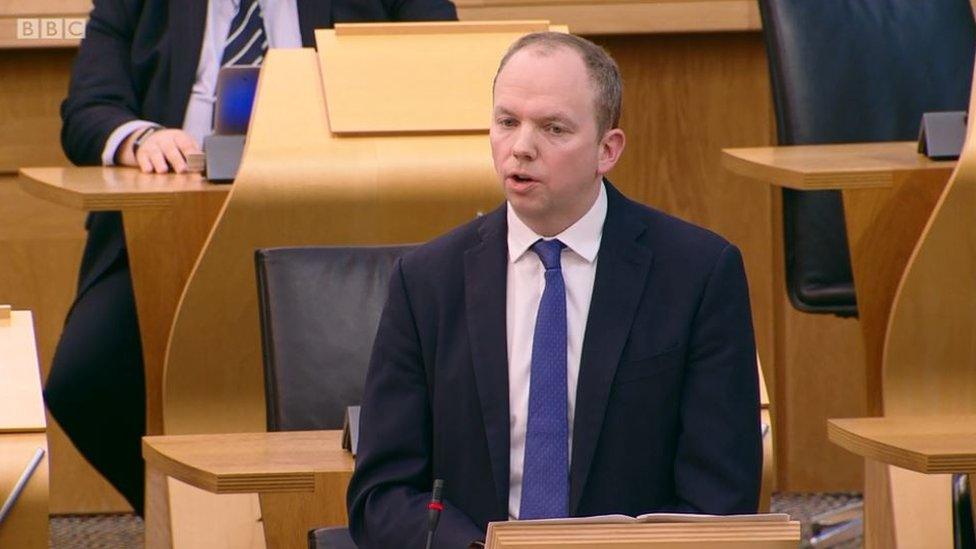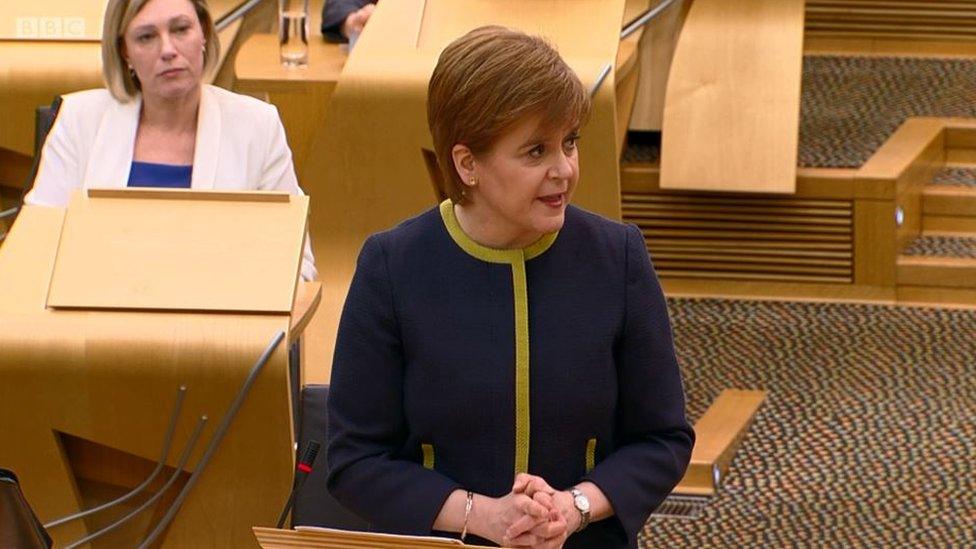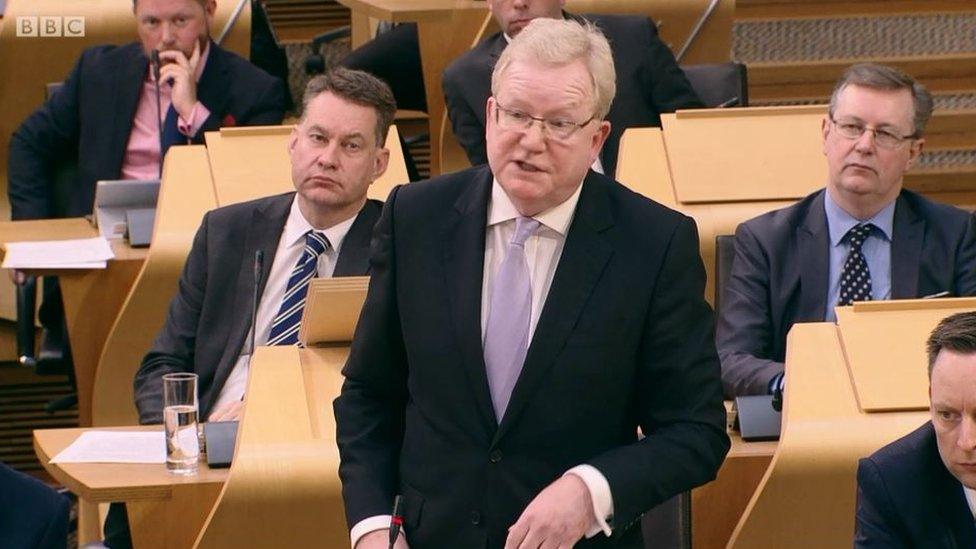What would Sir Walter Scott think?
- Published

Tory MSP Donald Cameron pondered the judgement of "the country". But which country?
Here's a fun game you can play at home - or in the pub. Perhaps as you while away the hours and days awaiting further Brexit developments.
The game is this. Ask yourself how famous figures from Scotland's past would have voted in the referendum of 2014 on independence. Or the 2016 plebiscite on membership of the European Union.
It's all nonsense, of course. One cannot translate long-distant perspectives into contemporary politics. But innocent merriment just the same.
How about Robert Burns? Or Sir Walter Scott, an outstanding literary genius who merits closer attention these days.
Sir Walter wrote: "Breathes there the man with soul so dead who never to himself hath said, this is my own, my native land."
Powerful stuff, eh? Widely quoted. But which land did he mean? Scotland? The UK? Scott was a confirmed Tory who played a key role in defending Scotland's ancient, distinct characteristics. You choose. Told you it was fun.
Now, I am always happy to linger in Scott-land. Never more content than when wandering round Abbotsford. But there is a vague purpose to this reflective meandering.
These thoughts were occasioned by a contribution from Donald Cameron of the Conservatives to the debate at Holyrood this afternoon anent Brexit and the potential terms of withdrawal.
Mr Cameron - the son of Lochiel, chief of the Clan - argued repeatedly that to thwart Brexit would be to negate and frustrate the expressed opinion of "the country". It would be, he averred, to betray "the country" - while noting that he, himself, voted Remain.

Nicola Sturgeon said the Scottish and Welsh governments were united in "dismay" about Brexit
His perspective on the European Union plebiscite is entirely consistent with his support for the rather older Union between Scotland and England. His remarks were delivered casually, without particular emphasis, part of a thoughtful speech.
But you could sense the SNP benches stirring, restlessly. Their country is Scotland. Their loyalty is to Scotland.
Which reminds us, once again, of the fundamental fault line which zigzags across the Scottish political landscape.
Nicola Sturgeon opened the debate by arguing that her government, despite loathing Brexit, had tried repeatedly to reach a compromise; for the UK, for Scotland. She said her initiatives had been utterly ignored by the UK government.
It was a powerful contribution from the FM. She noted that the Scottish debate was matched by a similar event in Cardiff Bay, with an identical motion.
Scotland and Wales - or, more precisely, their devolved governments - had been brought together, she argued, by "dismay, bordering on despair" at the Brexit negotiations.
Ms Sturgeon made relatively little of the issue of independence, on this occasion. She focused on the three aspects of the motion - opposition to the PM's deal, opposition to leaving with no deal now and in the future, plus a demand for a delayed Brexit.

Jackson Carlaw was the chief defender of the prime minister's deal in the Holyrood debate
It was left to Jackson Carlaw to accuse the FM of stirring up trouble over Brexit in order to foment support for the independence cause. And Mr Carlaw went further.
Even as the FM excoriated the UK government for lack of competence, Mr Carlaw tried to return the favour by arguing that Ms Sturgeon's stance on Brexit no longer met the interests of the Scottish people.
Which were? To respect the Brexit outcome, given that Scotland remains part of the UK, and to seek an orderly departure from the EU.
And there was more. Scotland, he said, now needed fresh governance. An administration free from the grievance which he attributed to the current team. And "clean leadership". An intriguing phrase, which he emphasised.
What did he have in mind? The return of a devolved Conservative government in the Holyrood elections of 2021.
Nationalists looked on with a mixture of amusement and anger. There was more of the latter when the deputy SNP leader, Keith Brown, arose to make his contribution. He said the Tories had lost all respect with their mishandling of Brexit - and he echoed the FM in suggesting that the Conservatives were now fundamentally and fatally divided.
Second referendum
Just as Ms Sturgeon made little, on this occasion, of independence, so she dealt relatively briefly - I emphasise, relatively - with the issue of a second referendum.
Ms Sturgeon stressed that remained her aim, the primary purpose at present in the Brexit debate. But it does not form part of the joint motion with Wales.
Why? The Welsh first minister's office told me the aim of the conjoined approach was to focus on the immediate challenges - particularly ruling out no deal - although it was emphasised that the FM in Cardiff, Mark Drakeford, has supported the principle of a second plebiscite.
A further exemplification of this subtlety came when Richard Leonard spoke at Holyrood as the leader of Scottish Labour. His was a well-structured contribution, drawing upon his experience as a trade union negotiator to lampoon the handling of the Brexit talks.
Mr Leonard said he backed a second vote. Challenged by Willie Rennie of the Liberal Democrats to clarify further, the Labour leader said, yes, he backed what his Lib Dem counterpart called a "People's Vote" - but it was still Labour's objective to secure a revised Brexit deal or a UK general election instead.
As ever, Brexit brings nuance in its wake.
Perhaps we should heed Mark Twain who noted: "Patriotism is supporting your country all the time, and your government when it deserves it."